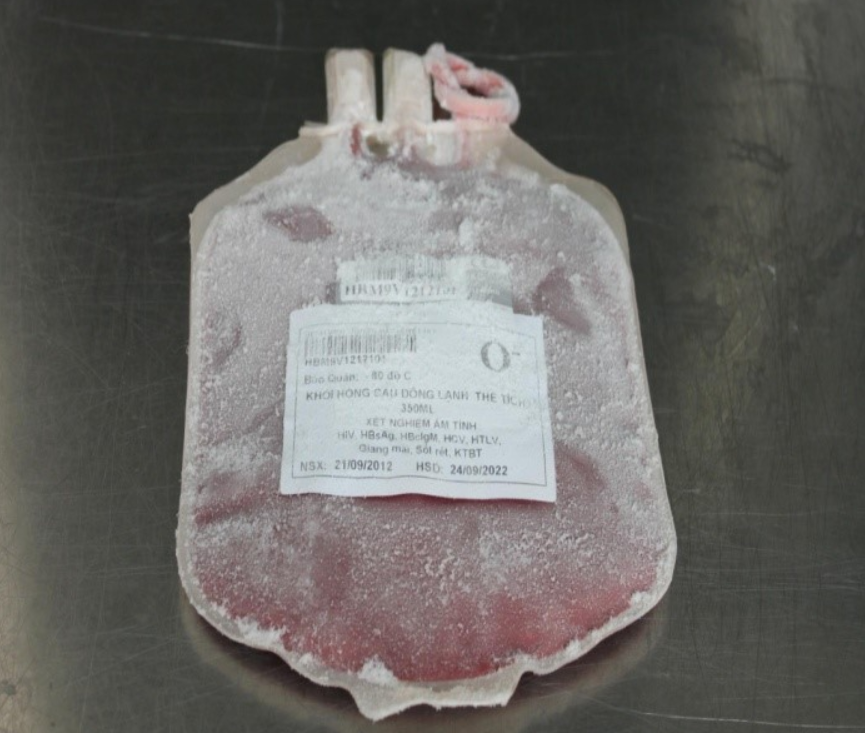Why is it necessary to freeze red blood cells?
Frozen red blood cells are a very special preparation in the red blood cell line. With harsh freezing conditions, the storage time will increase significantly, frozen red blood cells will play a key role, contributing to deciding the effectiveness of treatment for patients, especially in cases of severe illness. blood transfusion is rare.
1. What is frozen red blood cells?
The life span of red blood cells in the body is usually 120 days. After this time, the cell membrane of the red blood cells becomes brittle, hard, and loses its flexibility when passing through the microcapillary system in the spleen. Therefore, the spleen becomes the "graveyard" of old red blood cells. Degradation products such as protein, iron will be recovered to make new red blood cells; Other unusable ingredients will be excreted through the digestive tract and excreted.
Therefore, when donor blood is collected, even if it is stored in an ideal environment at 2 to 6oC, the shelf life is quite limited, not exceeding 35 to 42 days. Thus, to be able to store longer, hematologists have performed freezing of red blood cells. This is especially important when giving rare blood types or in special cases in the indications section.
Thus, frozen erythrocytes are erythrocytes stored in a cryogenic environment at a temperature of minus 60oC or less along with a glycerol-containing frozen erythrocyte protective solution. At this time, the shelf life of frozen red blood cells can be up to 10 years.

Hồng cầu đông lạnh
2. Why is it necessary to freeze red blood cells?
Anemic patients with very rare blood types and allogeneic immunity with many blood group antigens have a very high prevalence in the community. At this time, there is a need to use units that have a compatible group with the patient and do not have common antigens in blood donors.
Besides, in people with diseases that do not produce red blood cells such as bone marrow failure, the need for blood transfusions many times, the ability to create an immune response with human blood, even when performing blood transfusions from the same group, will increase. Thus, these subjects have to face a high risk of blood transfusion accidents in the next blood transfusions.
Therefore, the solution for the above cases is to use frozen red blood cells with a shelf life of 10 years from the date of harvest. This way, rare blood types will always be stored, ready to use in urgent situations. At the same time, the method of freezing will support patients who have been assessed as likely to need autologous blood transfusion, especially after organ and marrow transplantation. By storing their own blood when the body is most stable, the patient has the opportunity to receive this blood back a very long time in the future with maximum compatibility.
Besides, in people with diseases that do not produce red blood cells such as bone marrow failure, the need for blood transfusions many times, the ability to create an immune response with human blood, even when performing blood transfusions from the same group, will increase. Thus, these subjects have to face a high risk of blood transfusion accidents in the next blood transfusions.
Therefore, the solution for the above cases is to use frozen red blood cells with a shelf life of 10 years from the date of harvest. This way, rare blood types will always be stored, ready to use in urgent situations. At the same time, the method of freezing will support patients who have been assessed as likely to need autologous blood transfusion, especially after organ and marrow transplantation. By storing their own blood when the body is most stable, the patient has the opportunity to receive this blood back a very long time in the future with maximum compatibility.

Đông lạnh hồng cầu giúp bệnh nhân lưu trữ máu và sử dụng khi cần
3. How to use frozen red blood cells?
The freezing environment when performing frozen red blood cell units will greatly increase the red blood cell reserve time. Shelf life is 10 years when storing red blood cells with 40% glycerol solution at a temperature from minus 80oC to minus 60oC.
Because of the extremely harsh storage environment, before being transfused to the patient, frozen red blood cells must be thawed, washed and removed the protective solution, diluted in physiological saline or supplemented with saline. add red blood cell preservation solution.
However, if thawed, the shelf life is only 14 days from the date of thawing. In addition, since thawing and washing of erythrocytes to remove glycerol in an open system, the shelf life is not more than 24 hours if stored between 2oC and 6oC and not more than 6 hours if stored at room temperature. .
In addition, other regulations that need to be followed when dispensing blood and blood transfusion for frozen erythrocytes also need to be followed in the same way as for other blood products.
In summary, frozen red blood cells provide a longer storage time, are a relatively safe solution, and ensure life for people with rare blood types or who have had an allogeneic immune reaction to many people. previous blood group antigens. In addition, the method of freezing red blood cells is also a way to store blood for yourself, performing autologous blood transfusion on high-risk subjects.
Reference source: Transfusion.com.au; Ncbi.nlm.nih.gov
MORE:
How long do red blood cells live before they die? How many red blood cells in the body? The role of red blood cells, platelets, and white blood cells in the body
Bài viết này được viết cho người đọc tại Sài Gòn, Hà Nội, Hồ Chí Minh, Phú Quốc, Nha Trang, Hạ Long, Hải Phòng, Đà Nẵng.






